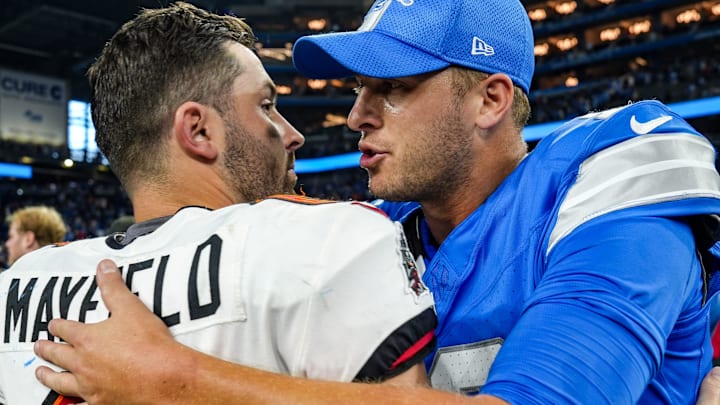Why Lions QB Jared Goff Dropped Back So Often Explained

Supporters of the Detroit Lions expected the team to run the ball more than what was called against the Tampa Bay Buccaneers.
Prior to Week 2, the lasting image was running back David Montgomery moving the football effectively on the ground against the Los Angeles Rams and scoring the game-winning touchdown.
It was impressive to see the Lions bully another team in order to win a football game in overtime.
Against the Buccaneers, quarterback Jared Goff dropped back to pass 55 times and Montgomery did not see the field as much as expected, as Jahmyr Gibbs recorded more offensive snaps.
Gibbs had 20 touches, 13 on the ground to go along with seven receptions, while playing 53 snaps. Montgomery, meanwhile, rushed 11 times for 35 yards and had four receptions on 30 total snaps.
Dan Campbell explained the plan was to open up the run game via the passing game. Detroit's fourth-year head coach noted the game reminded him of the playoff loss to the 49ers, where there were struggles rushing the football in the fourth quarter.
“I think what we were, we really wanted to open up the run game with the pass game. There again, the run game — it was somewhat a mirror image — Ben and I were talking this morning. It was somewhat a mirror image of the playoff game a little bit once we got to the fourth. And that’s where we just couldn’t quite get our run game going in the fourth.
"That’s another area where it’s a no gain, it’s a gain of three and then all of a sudden you’re third-and-7. You find a way to get it out, you go back to the run game, you’re not getting the yards you want to get and it sends you back to the pass game.," Campbell explained further. "That’s all. We were so close on it, too. It wasn’t good enough, but man, we were one block away. We were a shoestring away from busting some of these out of there. Listen, it didn’t work out. I liked the game plan on both sides of the ball, we just didn’t get it done.”
The Lions were predominately pass-oriented in the red zone, as many of the plays resulted in Goff making short throws. This was the result of the Buccaneers' defense playing solid coverage and stifling the run attempts on early downs.
"Our run game in the red zone wasn't as good as it's been," Campbell said. "When you look at the runs we had, aside from the fourth-and-1 late in the game where Gibbs busted out of there, that was a significant run. But, man, there was a lot — we get a no gain, we get a three, we get a minus-four. That just makes it harder down there. They were doing a good job of dropping with depth, buzzing the flats, and really forcing you to check it down. So, look, there's a lot of little things that we've got to clean up, and I'm telling you it's details. It may not look like it now, but we are so close. We are so close."
